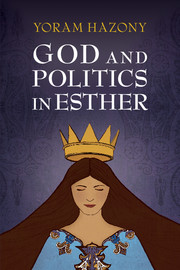Book contents
- Frontmatter
- Dedication
- Contents
- Preface
- Introduction
- Esther One
- Esther Two
- Esther Three
- Esther Four
- 10 Pressure
- 11 Court Jew
- 12 The Decision
- Esther Five
- Esther Six
- Esther Seven
- Esther Eight
- Esther Nine
- Afterwords
- Notes
- Index of Names
- Scriptural and Rabbinic References
- The Hebrew Esther Text
- Miscellaneous Endmatter
11 - Court Jew
from Esther Four
Published online by Cambridge University Press: 05 March 2016
- Frontmatter
- Dedication
- Contents
- Preface
- Introduction
- Esther One
- Esther Two
- Esther Three
- Esther Four
- 10 Pressure
- 11 Court Jew
- 12 The Decision
- Esther Five
- Esther Six
- Esther Seven
- Esther Eight
- Esther Nine
- Afterwords
- Notes
- Index of Names
- Scriptural and Rabbinic References
- The Hebrew Esther Text
- Miscellaneous Endmatter
Summary
Perhaps Mordechai succeeds in touching others among the courtiers in the four days he sits in sackcloth at the entrance to the palace. But as is often the case, the narrative tells us only of the one instance that in the end proves to have mattered: the queen. Upon hearing of his protest, Esther is “exceedingly distressed” (4.4) and sends Mordechai a change of clothes that he may immediately strip off the dirt in which he is attired. This he refuses to do, and only then does Esther send a trusted servant to inquire into the cause of the uproar.
The sequence of events tells us much about the mindset of the queen. Esther is “exceedingly distressed,” as it turns out, not by the impending slaughter of her people, of which she is ignorant, but by the appearance of her cousin before the court carrying on so and in such attire. Knowing nothing of the background, apparently not even of the confrontation that had erupted between Mordechai and the vizier days earlier, she fears only that offense will be given against the norms of court conduct, the law, and the king himself. She sees everything that Mordechai has taught her about gaining favor and influence being set to torch, and everything he has gained by years of building himself up as a loyal servant of the king about to be ruined in a single, incomprehensible act. Esther does not even need to know the subject under discussion and yet she is already aghast, refusing to go along, trying to make him stop.
When the chamberlain comes out to Mordechai, we find that the Jew is fully prepared to receive him. Any suspicion that Mordechai's act may have been ill prepared and impulsive is allayed when he explains the content of the decree, relates inside information about the vizier's effort to bribe the king, and then hands him a copy of the decree itself that he has prepared. Finally, he comes forward with a demand: that Esther go in to the king and urge him to repeal the law.
- Type
- Chapter
- Information
- God and Politics in Esther , pp. 83 - 90Publisher: Cambridge University PressPrint publication year: 2015

